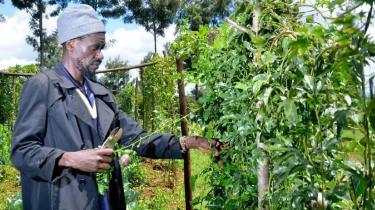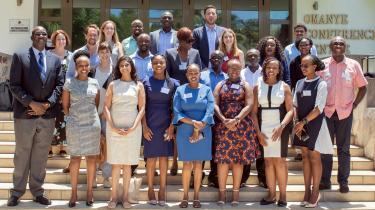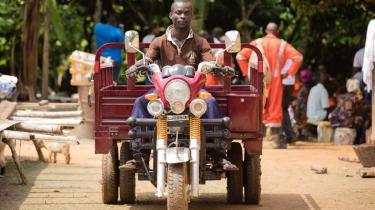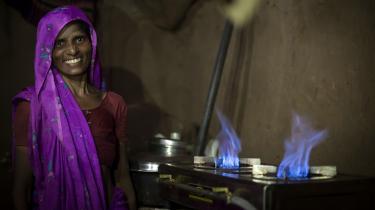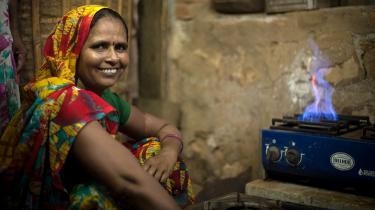Challenge funds such as the MasterCard Foundation Fund for Rural Prosperity (FRP) require robust yet flexible results measurement frameworks that capture impact at the portfolio level while at the same time monitoring and reporting progress at the project level and ensuring learning is reflected and integrated. As part of a fund management consortium with KPMG and Nathan Associates, Triple Line, as the Monitoring, Evaluation and Learning Partner, has led the design of the FRP’s overall results and impact measurement framework, produced a set of in-depth impact studies, and implemented a learning agenda aimed at capturing and disseminating the experience of the FRP portfolio.
The MasterCard Foundation Fund for Rural Prosperity is a US$50 million programme which provides grants on a competitive basis to private sector companies to expand financial inclusion for the rural poor. In total, it has now provided funding to 38 projects across 15 countries. It has supported a wide range of different companies, including financial service providers, mobile money operators, agribusinesses and solar home system companies. FRP-supported products had reached more than three million customers by June 2020.
The FRP required a comprehensive results measurement framework which captured impact at the portfolio level yet was also flexible enough to assess progress at the project level. To maximise the potential of the programme, the FRP also needed a significant learning component, to capture and disseminate insights provided by the programme’s recipients and beneficiaries. Triple Line has significant experience in developing results frameworks which enable programmes to monitor outcomes at both the project and at the portfolio level. Our technical expertise in private sector development, agriculture and youth employment also meant that we were well-placed to lead on learning, with the capacity to distil and synthesise key insights, and the credibility to communicate key learnings to a wider group of stakeholders.
The Triple Line team led the initial design of the programme’s results framework, including the overarching theory of change, the log frame, and the practical structure and processes which underpin robust monitoring and evaluation. These included the development of reporting and data collection tools, and guidance for grantees on monitoring and evaluation. During the onboarding process for grantees, we led participatory workshops on monitoring and evaluation, and provided further capacity building and support to grantees on a tailored, individual basis.
A core part of our role has been to conduct field verification trips to projects. On these trips, we interview company stakeholders and key informants, and run focus group discussions with project beneficiaries. This process is designed to verify self-reported information, test the underlying logic and rationale behind a project and to validate core assumptions within the project theory of change.
We have also designed and implemented a series of endline impact studies on some of the FRP’s high-impact projects. These studies collect data using mobile survey techniques to better understand how the FRP has contributed to increasing financial inclusion, income and resilience for beneficiaries – especially during the Covid-19 pandemic.
We developed an analytical framework for understanding the relationship between financial inclusion and job creation, and applied this to the wider portfolio
Our initial learning focus was on the link between rural financial inclusion and job creation. Drawing on both the wider literature and insights from the FRP portfolio, Triple Line developed an analytical framework for understanding the relationship between financial inclusion and job creation. We then applied this framework to the wider portfolio and used it as an assessment tool to understand the different mechanisms by which the FRP has contributed to the creation of rural livelihoods opportunities – both directly and indirectly. Future topics on our learning agenda include understanding the broader economic transformation and indirect job creation catalysed by FRP-supported projects in selected value chains and local geographies, and capturing the challenges and opportunities of working with smallholder farmers.
Triple Line is also leading a series of in-depth studies on a small sample of the FRP’s highest impact projects. In 2020, these have focused on using phone surveys and key informant interviews to understand how both companies and customers have been affected by the Covid-19 pandemic. In particular, the studies offer a unique opportunity to understand how FRP-supported financial products have impacted the resilience of customers in navigating the crisis. In 2021, the final year of the FRP, we will conduct larger and more robust surveys to assess how the programme has contributed towards increasing incomes, resilience and financial inclusion.
As a result of our support, the FRP has a robust and comprehensive results measurement framework, which demonstrates the impact at the portfolio level but also enables bespoke monitoring at the project level. The fund has now reached more than three million customers, and successfully demonstrated the commercial potential of several innovative new business models. Our learning paper on the relationship between financial inclusion and job creation has been published, and has helped feed into the MasterCard Foundation’s wider body of programming as part of their strategy, Young Africa Works. We are excited to continue to support this innovative and impactful programme and produce insightful and influential learning until the closure date in December 2021.
